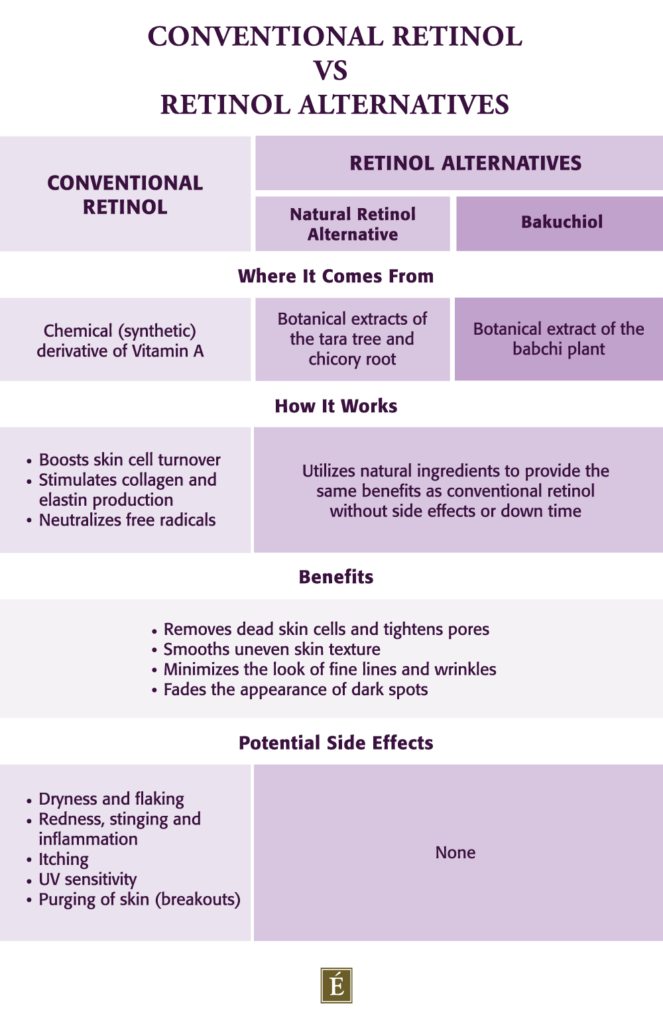What Is Retinol? Benefits, Side Effects & Natural Alternatives

Conventional retinol has long been a mainstay of skin care, finding its place in topical formulas that target the visible signs of aging. Unfortunately for some, the benefits of conventional retinol come with plenty of uncomfortable side effects. If you’re interested in finding out more about conventional retinol, but looking to avoid the side effects, you’ve come to the right place. Read on for our guide to conventional retinol in skin care and how to incorporate natural alternatives into your routine.
What Is Retinol?
Conventional retinol is a synthetic derivative of Vitamin A, an antioxidant that is essential for healthy eyes and skin. Because the body cannot produce this vitamin on its own, it needs to be supplied by diet and/or applied topically to the skin. It is often added to skin care products because of its ability to promote skin cell turnover, build collagen, fight free radicals and target fine lines and wrinkles.
How Does Retinol Work?
In order for the skin to benefit from retinol, enzymes in the body must convert it to retinoic acid (also known as tretinoin), the active form of Vitamin A. Retinoic acid works on a cellular level to optimize several functions that improve skin’s health and vitality. Among these functions:
Speeds Up Skin Cell Turnover
Efficient cell turnover is necessary for skin growth and repair. When you are a child, your skin cells naturally turn over every two weeks. However, as early as your twenties, the turnover process starts to slow to every 28-35 days. By fifty, it takes as long as 45-90 days for dead skin to fully shed from your skin’s surface. As a result, skin becomes drier, thinner and more pigmented. Conventional retinol prompts surface cells to turn over more quickly, enabling your skin to grow healthy cells and shed dead layers more efficiently.
Stimulates Collagen And Elastin Production
Over time, your skin’s stores of collagen and elastin — proteins that provide necessary support and elasticity to the skin — begin to deplete. Suddenly, skin starts looking less dense, plump and smooth. As the production of collagen and elastin declines, the skin begins to loosen and sag, and fine lines and wrinkles set in. Retinoic acid not only stimulates the production of new collagen and elastin, it also prevents their breakdown, helping your skin stay elastic (aka, able to bounce back).
Neutralizes Free Radicals
Ninety percent of skin aging is caused by environmental factors like pollution, blue-light and UV rays. These stressors expose skin to free radicals — highly reactive molecules that cause oxidative stress and damage healthy skin cells. Unchecked, this can degrade the skin’s structural integrity and lead to premature aging. Conventional retinol’s antioxidant properties neutralize free radicals and reduce their reactivity, thereby improving your skin’s resilience.
Retinol Benefits And Side Effects
Through these actions, conventional retinol provides the following benefits:
- Removes dead skin cells
- Clears congestion
- Tightens pores
- Smooths uneven skin texture
- Minimizes the look of fine lines and wrinkles
- Keeps skin firm and plump
- Fades the appearance of dark spots
However, regular use of conventional retinol can cause the following side effects:
- Dryness
- Peeling
- Redness
- Itching
- Irritation
- UV sensitivity
Most dermatologists advise that you skip conventional retinol if you suffer from rosacea, eczema, psoriasis and other inflammatory skin conditions. It’s also a no-go for sensitive skin and super dry complexions.

A Retinol Alternative
You can reap the benefits of conventional retinol (and skip its side effects) by opting for a natural, botanical-based alternative like bakuchiol. Bakuchiol is an extract derived from the leaves and seeds of the babchi plant. It has been used in Indian Ayurvedic and Chinese medicines for hundreds of years, but has only recently been introduced to the modern skin care landscape.
A plant-based powerhouse, bakuchiol offers many of the same results as conventional retinol without the harsh side effects or concerns. It can reduce the appearance of fine lines and wrinkles, help restore firmness, refine skin texture and even out the look of skin tone in a gentle yet effective way.
Benefits Of Bakuchiol
Doesn’t Irritate
Peeling, redness and sensitivity are often associated with a topical retinoid. Bakuchiol is well tolerated by most skin types, including sensitive, and can be used day and night (conventional retinol should only come out after dark) because it doesn’t cause sun sensitivity, which is a major bonus.
Smooths The Look Of Fine Lines And Wrinkles
Clinical studies have demonstrated bakuchiol’s potential in minimizing the appearance of fine lines and wrinkles. Its ability to enhance cell turnover results in smoother and more even-looking skin by boosting elasticity and firmness. Incorporating bakuchiol into your skin care routine can help you achieve a youthful-looking and rejuvenated complexion.
Improves Firmness And Elasticity
As skin ages, it’s common for elasticity and firmness to decrease. This loss of elasticity can be caused by a reduced production of natural oils, pollution, oxidative stress from sun exposure and gravity. Studies have shown that, much like conventional retinol, bakuchiol can improve firmness and elasticity in the skin. Bakuchiol slows the breakdown of collagen and increases elasticity, giving you skin that looks firmer, plumper and tighter.
Evens Out Skin Tone
Uneven skin tone can show up in a number of ways. Hyperpigmentation that shows up as blotchiness, dark spots or uneven texture can be caused by sun damage, melasma and acne scarring. Conventional retinol is often suggested as a way to fade the appearance of dark spots — though it can be a slow process and irritating to the skin. Bakuchiol can be a safer alternative to conventional retinol for people looking to even out their skin tone. It will help encourage cell turnover without causing irritation.
Suitable For All Skin Types
As mentioned, bakuchiol is generally well tolerated by all skin types. Whether you have oily, dry, sensitive skin or some combination, this is an ingredient that will almost certainly work for you. Like with all new ingredients, it makes sense to start out slow and see how your skin reacts, but it’s safe to say that chances are, your skin will love it and you will love the results!
How To Add Natural Retinol To Your Skin Care Routine
If you’re liking the sound of this plant-based retinol alternative, our new Bakuchiol + Niacinamide Collection might be exactly what your skin needs. We have created two new products that lean into the benefits of bakuchiol as well as another major skin care multitasker, niacinamide. A form of Vitamin B3, niacinamide helps lock in hydration, minimizes large pores, improves the look of uneven skin tone, softens the appearance of fine lines and visibly brightens the skin. Like we said, a major multitasker.
The new collection includes two products, a moisturizer and an SPF fluid that introduce a combination of ingredients designed to hydrate, replenish and protect your skin, while revealing a soft, smooth complexion.
Our Bakuchiol + Niacinamide Moisturizer will help restore your skin’s natural hydration and minimize the look of fine lines and wrinkles. This gel cream moisturizer is formulated with the combination of retinol alternative bakuchiol and niacinamide, plus hydrating panthenol. This trio helps to smooth wrinkles while visibly firming skin and minimizing the look of large pores and uneven texture with no visible irritation.
